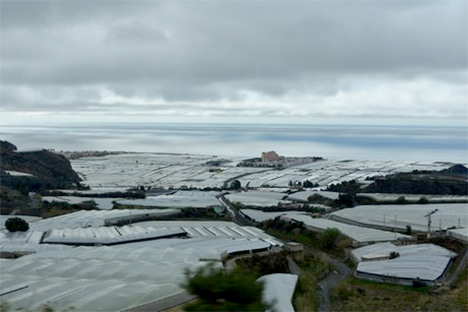No less than 150,000 people have to go to work every day in the Spanish greenhouse vegetable region of Almeria - but since March 14th, cars can be only occupied by two people and vans and buses can only be half-filled. All to contain the COVID-19 virus, of which Spain is enduring a severe outbreak. For the same reason restaurants are closed and tourism is at a standstill. The vegetable garden of Europe is now struggling with stagnating sales figures, a local market that does not run smoothly and a considerable absence in the workplaces. The hardest blows, however are currently taking place in the flower and plant sector. Many spring bloomers are produced in the country.
 A photo of Almeria, Spain, where over 60% of the Spanish horticultural greenhouses are concentrated: approximately 31,300 ha. The growers export over 70% of their production.
A photo of Almeria, Spain, where over 60% of the Spanish horticultural greenhouses are concentrated: approximately 31,300 ha. The growers export over 70% of their production.
Hygiene measures
"Growers are doing the best they can at the moment and there have also been some campaigns from the government to thank them for keeping the food stock up to date. As in other European countries, the food supply is of vital importance", says Jan van de Blom of the Coexphal cooperative.
"On the one hand, the work goes on and employees are able to make it to the greenhouse and to do their job. Provided they comply with the distance and hygiene rules, crop consultants and suppliers can still enter the greenhouses, because these are essential professions to keep the industry going. And because of the high virus pressure growers are dealing with in general, the horticultural industry is used to strict hygiene measures. Growers know how to deal with plant viruses and extend these measures to the COVID-19 virus. They are well prepared and think seriously about how to prevent contamination", Jan says.
The greenhouses are equipped with informative posters in six languages to also update international workers with information on hygiene rules, regular temperature measurements and recognisable symptoms. Much focus is on hand washing: how, why and how often. Disinfectant gels are placed in the packing stations and workers work with gloves where necessary. "Social distancing in the greenhouse isn't the problem either, because they often work a long way from each other."
Transport
Bigger issues, however, are the transport of employees to and from the greenhouses. Despite the fact that the virus itself is not much present in Almeria, the consequences are. Because of the declared state of emergency it is currently only allowed to sit with 2 people in an ordinary car, in a van with 3, and buses are only allowed to fill 50% of their capacity. "Buses normally used to take children to school are now used for transport to and from the greenhouses," says Jan, "but in Almería, 150,000 people have to go to work every day, which nowadays is not possible." At the moment between 10 and 30% of the employees of greenhouses and packing stations are unable to go to work, the organization estimates.
Market struggles
There are also struggles in selling the products. Almeria is an important export market and supplies a large part of Europe with food. At first the orders seemed to continue, but now that the hospitality industry and tourism throughout Europe are stagnating and the hoarding actions of consumers all around the continent seem to be decreasing as well, there has been a considerable stagnation in exports and cancellations of orders. "We see the same development going on in the national market. Where at first demand was high because people decided to stock up on a lot of food and because they often use more at home than when they go out for dinner, this has also come to a standstill. The Spanish season lasts another two months here and it seemed that the price for the season was largely determined, but now the sales have been disrupted severely. It is important for our region that the transport of goods continues and that the borders remain open," says Jan. "That product continues to be transported to France, for example."
Potted plants
In Spain too, however, the hardest blows are currently taking place in the flower and plant sector. Many spring bloomers are produced in the country. "Getting the flowers to bloom in the Netherlands is a lot more difficult than here, even when artificial light is used," says Jan. "These plants find ideal growing circumstances in Almería. Hibiscus and dipladenia, for example. But the market has completely collapsed."
A total of around 500 hectares of ornamental plant cultivation is located in the region, mainly potted plants. Just as in the food horticulture sector, the character of the companies differs a lot: from small businesses where the work is mainly done by the family, to larger conglomerations of dozens of hectares. Some alternate the growing of potted plants with that of peppers, tomatoes, aubergines, etc. from seed in summer.
However, one thing is certain: Many flowers and plants are normally sold around Easter and Mother's Day, and many garden centres that normally have many customers in spring are now closed. "Growers lose 70% of their annual turnover in these two or three months. A number of larger growers do have some reserves, but the smaller growers have less". The question now is if there will be governmental support or an emergency plan. "We'll have to wait and see. European regulations are needed for governmental support, because it is forbidden to supply aid to a particular industry. However, a lot of people in Spain need help at the moment."
